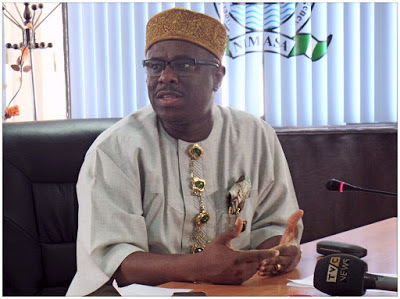DG of NIMASA, Dakuku Peterside To Unveil Growth Plan For Maritime
The apex maritime regulator, Nigerian Maritime Administration and Safety Agency (NIMASA), has announced a three-year Maritime Business Growth Plan (MBGP) for the development of the industry.
The agency in a statement made available to NF-Reports disclosed that it would embark on its core statutory mandate for the development of the maritime industry.
Director General of the agency, Dr Dakuku Peterside, dropped the hint at a maritime industry stakeholders meeting held in Lagos. He said that the agency was determined to reposition the maritime industry for greater heights.
He promised to change the agency’s work culture for greater productivity, adding that his management would identify the challenges facing the industry and proffer solutions to them.
The director general called on stakeholders to offer every kind of suggestions that would assist the agency to perform more than ever before in its statutory obligations.
Peterside stressed that the agency would look at the structure of NIMASA and improve on the work culture, vowing that under the present dispensation, everyone in NIMASA must be made to perform.
He said that the present administration would be measured by how much the agency had impacted on the industry in terms of growth.
The NIMASA boss appealed to the stakeholders for cooperation, noting that the strength of the agency was in the people it serves.
Peterside said that management was making moves to lift the maritime industry to greater heights in order to make Nigeria the hub of maritime trade in the West and Central African subregion. The director general noted that the transformation of the sector would attract more business to the country.
He said: “Our performance will be service-based and not metric based, the focal point of which will be to create the enabling environment to gainfully engage as many stakeholders as possible with a view to creating wealth and generating employment for the overall good of the maritime industry and the national economy.”
Former Director-General of the agency, Mr Temisan Omatseye, said that the original structure of NIMASA was yet to be implemented. Omotseye, who is also the President of African Shipowners Association, explained that the structure in place now was the old one inherited from the defunct National Maritime Authority (NMA).
He advised the director general to look out for the Nzewu report, to assist him in repositioning the industry. Omatseye said that there was nothing wrong with the Cabotage regime, but the enforcement.
He said that with Cabotage Act, no foreign ship was supposed to operate in the nation’s waters the way it is now. He called on the management of NIMASA to demand for the licence of the foreign vessels currently on the territorial waters, saying this would force many of the ships to flee.
Stakeholders at the summit also pointed out the issue of poor capacity in the area of certification and called on the management to embark on aggressive training for surveyors.
Engr. Greg Ogbuagu said that the issue with NIMASA certification was one of corruption and not incompetence. He called for more training for the surveyors.
The agency in a statement made available to NF-Reports disclosed that it would embark on its core statutory mandate for the development of the maritime industry.
Director General of the agency, Dr Dakuku Peterside, dropped the hint at a maritime industry stakeholders meeting held in Lagos. He said that the agency was determined to reposition the maritime industry for greater heights.
He promised to change the agency’s work culture for greater productivity, adding that his management would identify the challenges facing the industry and proffer solutions to them.
The director general called on stakeholders to offer every kind of suggestions that would assist the agency to perform more than ever before in its statutory obligations.
Peterside stressed that the agency would look at the structure of NIMASA and improve on the work culture, vowing that under the present dispensation, everyone in NIMASA must be made to perform.
He said that the present administration would be measured by how much the agency had impacted on the industry in terms of growth.
The NIMASA boss appealed to the stakeholders for cooperation, noting that the strength of the agency was in the people it serves.
Peterside said that management was making moves to lift the maritime industry to greater heights in order to make Nigeria the hub of maritime trade in the West and Central African subregion. The director general noted that the transformation of the sector would attract more business to the country.
He said: “Our performance will be service-based and not metric based, the focal point of which will be to create the enabling environment to gainfully engage as many stakeholders as possible with a view to creating wealth and generating employment for the overall good of the maritime industry and the national economy.”
Former Director-General of the agency, Mr Temisan Omatseye, said that the original structure of NIMASA was yet to be implemented. Omotseye, who is also the President of African Shipowners Association, explained that the structure in place now was the old one inherited from the defunct National Maritime Authority (NMA).
He advised the director general to look out for the Nzewu report, to assist him in repositioning the industry. Omatseye said that there was nothing wrong with the Cabotage regime, but the enforcement.
He said that with Cabotage Act, no foreign ship was supposed to operate in the nation’s waters the way it is now. He called on the management of NIMASA to demand for the licence of the foreign vessels currently on the territorial waters, saying this would force many of the ships to flee.
Stakeholders at the summit also pointed out the issue of poor capacity in the area of certification and called on the management to embark on aggressive training for surveyors.
Engr. Greg Ogbuagu said that the issue with NIMASA certification was one of corruption and not incompetence. He called for more training for the surveyors.




Comments
Post a Comment